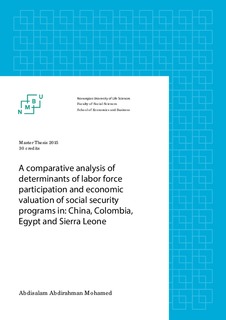| dc.description.abstract | Understanding labor market dynamics, especially in developing countries has become a central issue in light of the global financial crises of 2008. This study analyzed labor markets in four developing countries: China, Colombia, Egypt and Sierra Leone to estimate determinants of the labor force participation, wages, and willingness to pay for job-related benefits. It then quantified the monetary values of job benefits through the contingent valuation (CV) method. For the analysis, logistic, OLS, and Tobit models were used. The results of the logistic regression analysis revealed that gender, age, age-squared, marriage, household head, and difficult health were statistically significant determinants of the labor force participation in all countries. The study confirmed the findings of previous literature that women tend to have lower labor force participation than men. The impact of tertiary education on labor force participation was also positive and significant in Colombia and Egypt. Moreover, chronic and prolonged health problems precluded labor force participation in all the countries. The study unsurprisingly has shown that heads of household had extremely higher participation in all the countries. On the other hand, marriage only increased labor force participation in China and Sierra Leone, whereas it actually decreased in Egypt and Colombia. Location played a role in labor force participation as urban areas had significantly lower participation in China and Sierra Leone. Furthermore, results from the OLS regression analysis showed that gender, wealth and higher educational attainment were main determinants of wages. There was a gender pay differential between women and men in all countries, except Sierra Leone. Higher education significantly and positively affected wages in Colombia, Egypt and Sierra whereas it was insignificant in China. The results also demonstrated that the impact of wealth on wages was significant and positive in all countries, supporting the hypothesis that individuals with higher status are able to garner higher wages. Similarly, results from the Tobit model revealed that income, household size, location, gender and education played a role in determining willingness- to-pay (WTP) for social security and other job-related benefits. The impact of income on WTP for health insurance, pension benefits, and permanent contract was significant and positive for most countries. Men were also found to have slightly greater WTP for social benefits. The impact of education on WTP differed among countries and the types of benefits, and no clear patterns emerged.
Finally, the analysis of contingent valuation data showed that China consistently had a lower mean WTP for social benefits than Sierra Leone and Egypt; 2-5% and 4-20% of monthly income, respectively. The same pattern emerged for their willingness-to-accept (WTA) loss for job-related benefits. The study has also illustrated that individuals in all the countries, who participate in social security programs, as well as other job-related benefits, demanded a substantial increase in income, in terms of WTA compensation for losing access to social benefits. On the other hand, those, without social security systems and benefits were willing to contribute a significant amount of their monthly income to participate. | nb_NO |
